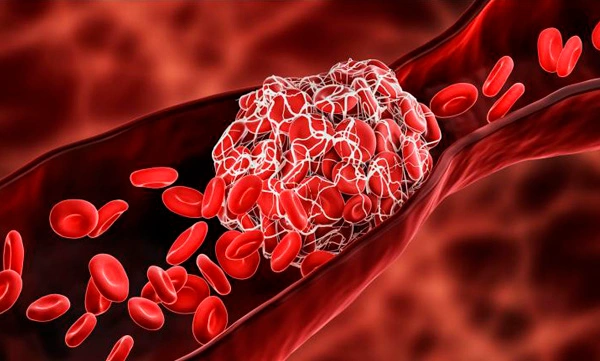Heart attack genetic

If you tested your DNA with a personal genomics service like 23andMe, AncestryDNA, FamilyTreeDNA, MyHeritage or another testing company, you can learn more about your risk factors for hundreds of diseases. By clicking the button above ⬆️, you can upload your raw DNA data file and receive a personalized 250-page health report with research links that is the most comprehensive.
Genetic predisposition, also referred to as familial predisposition, is a crucial risk factor for cardiovascular disease. It is an inherited susceptibility or condition for a particular illness.
Around 40% of the susceptibility to cardiovascular disease is attributed to genetic factors, with DNA playing a crucial role within genes. Genetic testing through molecular biology or cytogenetics can identify an individual's predisposition to such diseases. High blood pressure and arteriosclerosis are two instances of cardiovascular diseases that may be activated by genetic factors.
PHACTR1 has been confirmed as one of the leading genes responsible for coronary heart disease. Our laboratory is currently conducting extensive research on PHACTR1, as it has been found to not only cause coronary heart disease but also a variety of other vascular diseases such as migraine, fibromuscular dysplasia, and spontaneous coronary artery dissection.
Defining the genomic basis of MI has been more useful due to its greater restrictiveness as a phenotype compared to coronary artery disease.
Years ago, we came to the realization that treating a patient during a heart attack was akin to a "fire drill." Once the event has begun, it becomes exceedingly difficult to save the myocardium. This is particularly true for patients who wait more than two hours before seeking medical help. However, with the advancements in genomic medicine, we can screen individuals at higher risk and prevent MI more effectively. This knowledge will propel us forward in our quest to overcome this complex trait.
Follow the link of the selected polymorphism to read a brief description of how the selected polymorphism affects Myocardial infarction and see a list of existing studies.
SNP polymorphisms related to the topic Myocardial infarction:
| rs46522 | The rs46522 polymorphism of the E2Z ubiquitin-conjugating enzyme gene is associated with abnormal metabolic parameters in patients with myocardial infarction. |
| rs10811661 | The polymorphism is associated with impaired proinsulin conversion and redisposition to type 2 diabetes. |
| rs5918 | The A2 allele of the platelet-specific alloantigen system is encoded by rs5918(C), it is associated with increased risk of myocardial infarction, heart disease and resistance to the blood thinning properties of aspirin. |
| rs17465637 | SNP of the MIA3 gene associated with increased risk of myocardial infarction with odds ratios of 1.17 (CI: 1.04-1.32) and 1.37 (CI: 1.08-1.74) for carriers. |
| rs3798220 | rs3798220, also known as I4399M or Ile4399Met, is a SNP in the apolipoprotein (A) LPA gene , which has been reported to be associated with elevated plasma lipoprotein levels and increased cardiovascular risk, well-tolerated by low-dose aspirin. |
| rs1333042 | Intronic polymorphisms in the CDKN2B-AS1 gene are strongly associated with the risk of myocardial infarction and coronary heart disease. |
| rs2505083 | Increased risk of sudden myocardial infarction and coronary heart disease. |
| rs2895811 | HHIPL-1 gene polymorphism (rs2895811) is associated with cardiovascular risk factors and cardiometabolic parameters in patients with myocardial infarction. |
| rs1412444 | A single nucleotide polymorphism in the LIPA (lysosomal acidic lipase A) gene is associated with predisposition to premature coronary heart disease. |
| rs646776 | A new locus of coronary atherosclerosis and associations with myocardial infarction in coronary atherosclerosis. |
| rs10757274 | A genetic variant on chromosome 9p21 is the strongest genetic predictor of early myocardial infarction (heart attack) found so far. SNPs in this region are also associated with an increased risk of stroke, abdominal aortic aneurysm (AAA) and intracranial aneurysm. |
| rs514659 | |
| rs619203 | |
| rs886126 | |
| rs909253 | |
| rs974819 | |
| rs1041981 | |
| rs1048990 | |
| rs1231206 | |
| rs1333040 | |
| rs1333049 | |
| rs1746048 | |
| rs1842896 | |
| rs1994016 | |
| rs2048327 | |
| rs2259816 | |
| rs2383206 | |
| rs2383207 | |
| rs2515629 | |
| rs3127599 | |
| rs3729639 | |
| rs4773144 | |
| rs4804611 | |
| rs4977574 | |
| rs6504218 | |
| rs6601299 | |
| rs6725887 | |
| rs6905288 | |
| rs7025486 | |
| rs7203193 | |
| rs7569328 | |
| rs7697839 | |
| rs7767084 | |
| rs7801190 | |
| rs7808424 | |
| rs9268402 | |
| rs9546711 | |
| rs9818870 | |
| rs10757278 | |
| rs10933436 | |
| rs11066280 | |
| rs11206510 | |
| rs11650066 | |
| rs11669133 | |
| rs11671653 | |
| rs11924705 | |
| rs12200560 | |
| rs12413409 | |
| rs12526453 | |
| rs12740374 | |
| rs12936587 | |
| rs17114046 | |
| rs17672135 | |
About The Author
Li DaliLi Dali, a National Foundation for Outstanding Youth Fund recipient, is a researcher at the School of Life Sciences in East China Normal University. He earned his PhD in genetics from Hunan Normal University in 2007 and conducted collaborative research at Texas A&M University during his doctoral studies. Li Dali and his team have optimized and innovated gene editing technology, leading to the establishment of a world-class system for constructing gene editing disease models.


